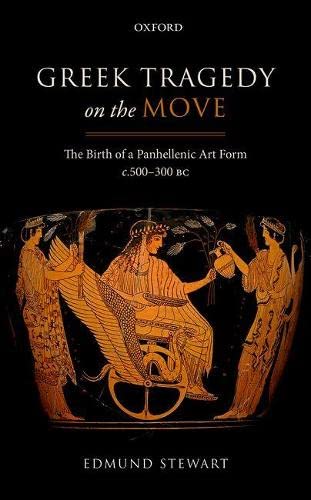All books / Book
Greek Tragedy on the Move: The Birth of a Panhellenic Art Form c. 500-300 BC

| Full title: | Greek Tragedy on the Move: The Birth of a Panhellenic Art Form c. 500-300 BC |
|---|---|
| ISBN: | 9780198747260 |
| ISBN 10: | 0198747268 |
| Authors: | Stewart, Edmund |
| Publisher: | Oxford University Press |
| Edition: | 1 |
| Num. pages: | 304 |
| Binding: | Hardcover |
| Language: | en |
| Published on: | 2017 |
Read the reviews and/or buy it on Amazon.com
Synopsis
This Volume Argues That The Story Of Tragedy's Development And Dissemination Is Inherently One Of Travel And That Tragedy Grew Out Of, And Became Part Of, A Common Greek Culture, Rather Than Being Explicitly Athenian. Although Athens Was A Major Panhellenic Centre, By The Fifth Century A Well-established Network Of Festivals And Patrons Had Grown Up To Encompass Greek Cities And Sanctuaries From Sicily To Asia Minor And From North Africa To The Black Sea. The Movement Of Professional Poets, Actors, And Audience Members Along This Circuit Allowed For The Exchange Of Poetry In General And Tragedy In Particular, Which Came To Be Performed All Over The Greek World And Was Therefore A Panhellenic Phenomenon Even From The Time Of The Earliest Performances. The Stories That Were Dramatized Were Themselves Tales Of Travel-the Epic Journeys Of Heroes Such As Heracles, Jason, Or Orestes- And The Works Of The Tragedians Not Only Demonstrated How The Various Peoples Of Greece Were Connected Through The Wanderings Of Their Ancestors, But Also How These Connections Could Be Sustained By Travelling Poets And Their Acts Of Retelling. Machine Generated Contents Note: 1. Recent Approaches -- A. Athens And Tragedy -- B. Tragedy Beyond Athens -- 2. New Directions -- A. Panhellenic Tragedy -- B. Panhellenic Networks -- C. Professionalism And Travel -- 3. The Argument -- 1. The Background I: Travelling Heroes And Panhellenic Tragedy -- Introduction -- 1. The Travelling Hero In Greek Poetry -- 2. Panhellenic Tragedy -- Conclusion -- 2. The Background Ii: Wandering Poets, Panhellenic Networks, And Professionalism -- 1. Introduction: Mobility In Archaic And Classical Greece -- A. The Culture Of Travel In Ancient Greece -- B. Professionalism And Travel -- 2. Networks Of Non-dramatic Poets C. 700 -- 300 Bc -- A. Aegean And Asia Minor -- B. The Greek Mainland -- C. The Greek West -- 3. Reasons And Motivations For The Travel Of Poets -- A. Exiles And Economic Migrants -- B. The Pursuit Of Fame -- C. The Pursuit Of Wealth -- Conclusion -- 3. Tragedy In Attica C.500 -- 300 Bc -- Introduction -- 1. The Audience -- 2. Non-athenian Performers -- A. Origins -- B. Impact -- Conclusion -- 4. Tragedy Outside Attica C.500 -- 450 Bc -- Introduction -- 1. Dramatic Performances Outside Attica -- A. The Greek Mainland -- B. The Greek West -- 2. The Plays -- A. Aeschylus' Aetnaeae -- B. Aeschylus' Persians And Its Trilogy -- Conclusion -- 5. Tragedy Outside Attica C.450 -- 400 Bc -- Introduction -- 1. Euripides' Archelaus, Temenus, And Temenidae -- A. The Myth And Its Purpose -- B. Possibilities For Performance -- 2. Euripides' Andromache -- 3. Euripides' Captive Melanippe And Aeolus -- A. The Myth And The Plays -- B. Possibilities For Performance -- Conclusion -- 6. Tragedy Outside Attica C.400 -- 300 Bc -- Introduction -- 1. A New Era? -- A. The Death Of Political Tragedy? -- B. Specialization And Professionalization: The Rise Of The Acting Profession? -- C. Old Tragedy Or New Tragedy? -- D. Conclusion -- 2. The Dissemination Of Tragedy In The Fourth Century -- A. Performance Venues -- B. Performers -- Conclusion -- Conclusion -- Appendices -- Appendix 1 The Settings Of Plays Of Greek Tragedy And Satyr Play -- Appendix 2 Non-citizen Performers In Attica -- Appendix 3 Phrynichus In Sicily?. Edmund Stewart. Includes Bibliographical References (pages 227-254) And Index.